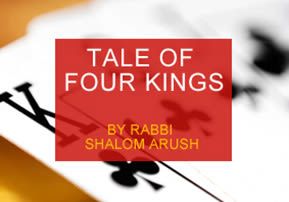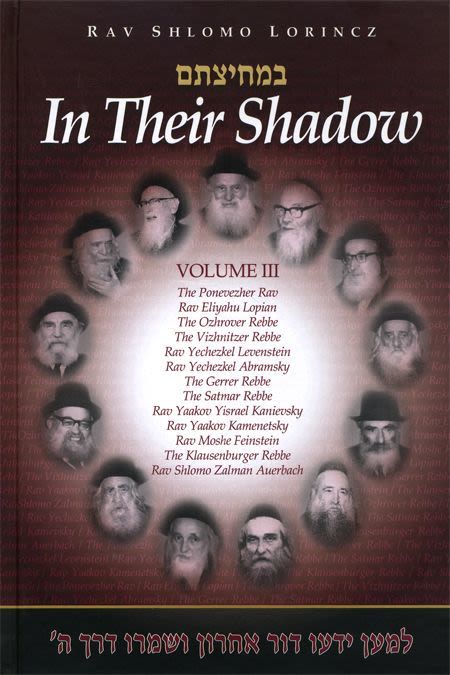
Tale of Four Kings
One of the big misconceptions of this generation is that if you're not successful, you're not worth anything. The Heavenly Court doesn't judge a person according to success...

Translated by Rabbi Lazer Brody
One of the biggest misconceptions of this generation is that if you're not "successful", you're not worth anything. The Heavenly Court doesn't judge a person according to success, because success is not up to you – it's up to Hashem! Hashem judges us according to our desire. We won't be asked after our 120 years on earth why we didn't succeed; we'll be asked why we didn't have the desire to succeed…
Another big misconception, even among observant Jews, is the "might of my right hand" doctrine. When they succeed, they attribute their success to themselves, so they become full of arrogance. The "might of my right hand" is heresy in every sense of the word, for Hashem "did, does and will do every deed" as the Rambam tells us in the 1st of our 13 principles of faith.
The Midrash (Yalkut Shimoni, Shmuel II:22, 163) tells the story of four kings of Israel, and their relative levels of trust in Hashem. Hold on for a surprise:
A battalion of Amalekites pillaged and destroyed the frontier village of Ziklag in southern Judea. King David said, "I'll pursue my enemy and I shall not return until they're all destroyed" (Psalm 18:38); with a small task  force, he pursued the Amalekite raiders and killed them all.
force, he pursued the Amalekite raiders and killed them all.
The combined army of a million Egyptian and Ethiopian soldiers were about to overrun Judea during the reign of David's great grandson, King Asa. Asa prayed to Hashem and said, "Hashem, I lack my great grandfather's power; I cannot kill the enemy. I will chase them, and You kill them!" Hashem answered Asa's prayer. Asa's smaller and apparently weaker army routed the Egyptian and Ethiopians.
King Yehoshaphat, Asa's son, faced the imminent existential threat of three hostile armies on his eastern border – Ammon, Moav and Edom – poised to attack Judea. Yehoshaphat turned in prayer to Hashem and said, "Hashem, I don't have the power of my father and great grandfather. I can neither kill nor chase the enemy. I will sing to You, and You fight the battle!" Yehoshaphat and his men then began singing praises to Hashem. Meanwhile, Hashem performed a great miracle: the Ammonite and Moabite armies attacked the Edomites, destroying them to the last man. After they had killed the Edomites, the Ammonites and Moabites killed each otherto the last man (see Chronicles II, Chapter 20).
King Hezekiah, a descendant of Jehoshaphat, faced the threat of a massive Assyrian army at his doorstep, threatening to conquer Jerusalem. He turned to Hashem in prayer and said, "Hashem, I do not have the strength of my forefathers. I can neither kill, nor chase, nor sing! I'm going to bed, Hashem, for I must wake up early and teach Torah tomorrow. You take care of the enemies!" In the morning, not a single Assyrian was left alive, for an angel of Hashem had smitten them (see Kings II, 18: 17-19).
* * *
According to the above Midrash, it seems that King Hezekiah was on the highest spiritual level, for he did the least effort and relied the most on Hashem. Conversely, it seems that King David was on a lower spiritual level, for he was more of an activist and apparently relied less on Hashem. Yet, such an interpretation is wrong, for it lacks an understanding of emuna.
In truth, King David was on the highest spiritual level. He could pursue and destroy his enemies without feeling that the "might of my right hand" was doing it – he knew that Hashem was doing it. Despite his phenomenal victories, he was so humble that he considered himself no better than a worm (see Psalm 22:7).
King Asa knew that he wasn't on the level of his great grandfather. If he destroyed an enemy with his own hands, he knew that he'd get a feeling of arrogance. But, he knew that he could chase the enemy without feeling that the "might of my right hand" was doing it, so that's what he did.
King Yehoshaphat knew that he wasn't on the level of his father King Asa. Even if he'd chase the enemy, he was afraid that he'd be arrogant. But, if he sang praises of Hashem while the enemy was being destroyed, he was confidant that he wouldn't feel like the "might of my right hand" was doing the job.
King Chezekiah, honest with himself, realized that any effort on his part would give him the feeling of the "might of my right hand". He therfore went to sleep and left everything up to Hashem.
True trust in Hashem doesn't mean leaving everything up to Hashem. We must do our part, especially in prayer, Torah study and mitzva observance, for that's what we're doing here in the physical world. True trust in Hashem means that whatever we do, we don't become arrogant for we know that it's not our power, but Hashem's power. So, the more a person truly trusts in Hashem, the more he becomes a worthy vessel for success, for he attributes his success to Hashem. That's the lesson we learn from the four wonderful kings. May Hashem renew the reign of the House of David speedily and in our days, amen!











Tell us what you think!
Thank you for your comment!
It will be published after approval by the Editor.